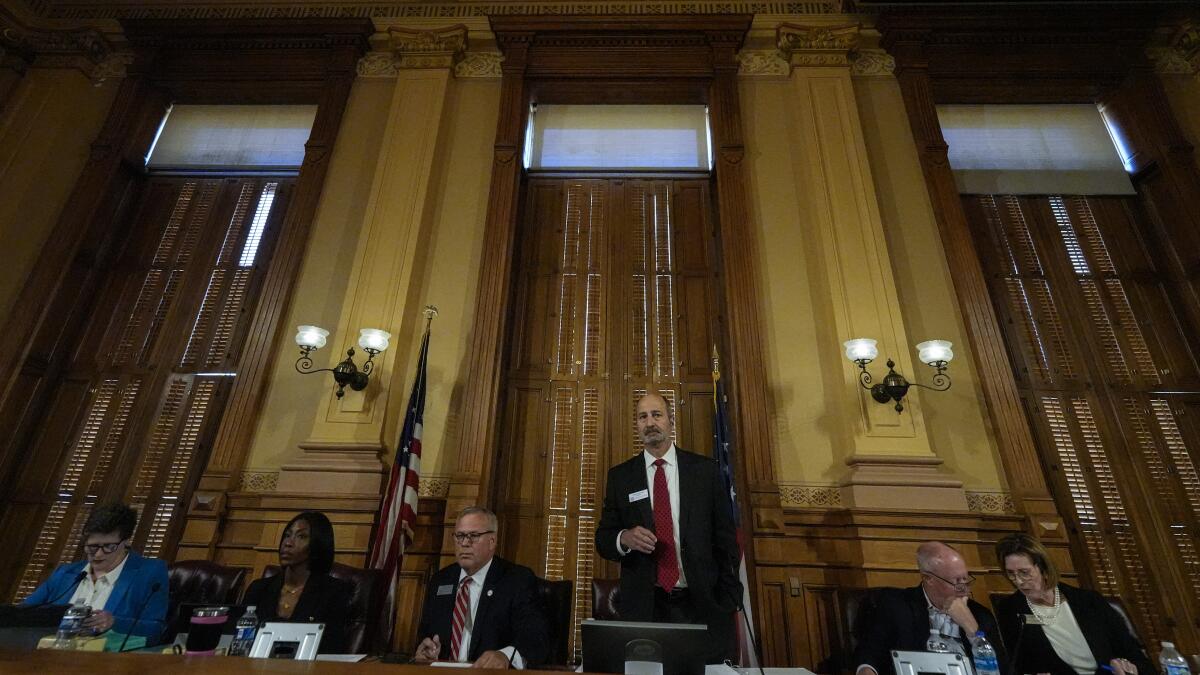Georgia State Election Board majority, praised by Trump, approves rule requiring hand count of ballots

- Share via
ATLANTA — Georgia’s State Election Board on Friday voted to approve a new rule that requires poll workers to count the number of paper ballots by hand after voting is completed, a change that critics worry could delay the reporting of election night results.
The board’s decision went against the advice of the state attorney general’s office, the secretary of state’s office and an association of county election officials. Three Republican board members who were praised by former President Trump during a rally last month in Atlanta voted to approve the measure, while the lone Democrat on the board and the nonpartisan chair voted to reject it.
The State Election Board has found itself mired in controversy in recent months as it considers new rules, many of them proposed by Trump allies. Democrats, legal experts and democracy advocates have raised concerns that new rules could be used by the former president and his supporters to cause chaos in this crucial swing state and undermine public confidence in results if he loses to Democratic nominee Kamala Harris in November.
In a memo sent to election board members Thursday, the office of Republican state Atty. Gen. Chris Carr said no provision in state law allows counting the number of ballots by hand at the precinct level before the ballots are brought to county election superintendents for vote tallying. As a result, the memo says, the rule is “not tethered to any statute” and is “likely the precise kind of impermissible legislation that agencies cannot do.” The memo warns that any rule that oversteps the board’s authority would be unlikely to survive a legal challenge.
Already, two rules the board passed last month having to do with the process to certify the vote count have been challenged in separate lawsuits, one filed by Democrats and the other filed by a conservative group. A judge has set an Oct. 1 trial on the Democrats’ lawsuit.
Republican Secretary of State Brad Raffensperger last month called the hand-counting rule “misguided,” saying it would delay the reporting of election results and introduce risks to chain-of-custody procedures.
Controversies over certification of election results are beginning to re-emerge as the nation heads closer to the fall 2024 presidential contest.
The new rule requires that the number of paper ballots — not the number of votes — be counted at each polling place by three separate poll workers until all three counts are the same. If a scanner has more than 750 ballots inside at the end of voting, the poll manager can decide to begin the count the following day.
Voters in Georgia make their selections on a touchscreen voting machine that then prints out a paper ballot that includes a human-readable list of the voter’s choices as well as a QR code that is read by a scanner to tally the votes.
Proponents say the rule is needed to make sure the number of ballots matches the electronic tallies on scanners, check-in computers and voting machines. The three workers will have to count the ballots in piles of 50, and the poll manager needs to explain and fix, if possible, any discrepancies, as well as document them.
Results could be delayed if polling places decide to wait until the to hand tally is finished before they send the memory cards that record the votes in machines to the central tabulation location.
Several county election officials who spoke out against the rule during a public comment period preceding the vote warned that having to count the ballots by hand at polling places could delay the reporting of election night results. They also worried about putting an additional burden on poll workers who will have already worked a long day.
Leaders of the Georgia Assn. of Voter Registration and Election Officials raised concerns similar to Raffensperger’s in a letter to the State Election Board last month, warning the rule would ultimately undermine confidence in the process. The nonprofit association’s members include more than 500 election officials and workers statewide, according to the organization.
Brumback writes for the Associated Press.
More to Read
Get the L.A. Times Politics newsletter
Deeply reported insights into legislation, politics and policy from Sacramento, Washington and beyond. In your inbox twice per week.
You may occasionally receive promotional content from the Los Angeles Times.










